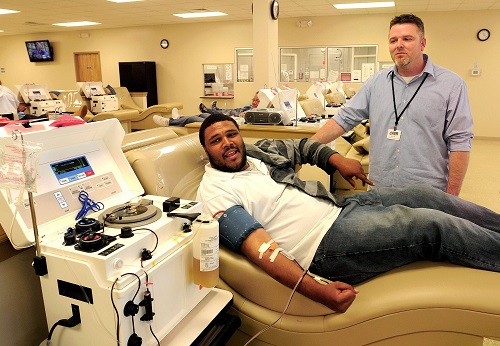Compared to blood donation, plasma donation is not a subject that is much talked about. In fact, the only time this subject warrants a mention is when there is a natural disaster or when there is a shortage of sorts. Whereas during blood donation, blood is simply taken away from the body, plasma is taken from the body separated from the blood and then returned to the body. This leads to the question "Does plasma donation hurt?"
Does Donating Plasma Hurt?
During plasma donation, your blood is drawn from your arm and transported to a machine by a sterile injection. The machine helps collect some plasma and sometimes platelets in blood and returns the remaining blood components plus some saline solution to the donor.
The plain truth in the process is that yes, it does hurt to some degree, but some describe it just like a bad sting. Since the needle used is slightly larger than the standard size syringe, so the pain felt is a little bit stronger than that from blood donation. Each session lasts about 45 to 60 minutes and donors can just lie there and watch TV, which can greatly distract them and make the pain unnoticeable. Besides, the pain subsides with each successive session – one basically becomes accustomed to it.
Ways to Reduce Pain During Plasma Donation
Since you get a positive answer to the question "Does donating plasma hurt?", you may really want to know how to decrease this pain. The following are the ways you can use to reduce pain during plasma donation:
- Pumping your hand using a squeeze. This numbs the nerves in the area of muscle that has been injected, keeps blood moving in the plastic tubes and stops the buildup of congealed blood, which could cause pain.
- Drinking plenty of water. This keeps the blood thin thus reducing pain when blood is pumped back to you. It also reduces the risk of clotting.
- Donate plasma in the early morning and evening. Plasma is best donated early morning or evening because liquids flow best when it is cold outside.

Drawbacks of Donating Plasma
Donating plasma is by and large a safe exercise and has been ongoing for a few decades now. After knowing "Does donating plasma hurt?" we are here to point out the drawbacks that might come from donating plasma:
- Bruising of the skin: This is to be expected for the simple reason that the repeated insertion of a needle in your hand will irritate the skin, leading to sore skin and bruising that may last for weeks.
- Nausea, dizziness and fainting: The loss of blood plasma in a short period of time makes some nauseous, which may also be accompanied by vomiting if the person in question fails to adhere to the prescribed diet regime before and after donation. Those who are underweight similarly fair badly because the plasma removed may take up a large part of their body plasma. Lastly, those who exert themselves physically during this time also run the risk of fainting.
- Hunger pangs: Plasma donation depletes a vital resource of the body, and one way the body recuperates is by feeding. It's true that donating could trigger a massive hunger pang or a voluminous appetite.
- Fatigue: This is almost to be expected. The body system has been placed under enormous strain, and energy reserves have been chipped away. The remedy for this is a long nap and plenty of bed rest to let the body recharge.
Other FAQs About Plasma Donation
Beside "Does donating plasma hurt?" Other questions that are often asked concerning plasma donation are captured below:
Is Donating Plasma Safe?
Yes. The material that comes in contact with the plasma is used only once and then disposed of. Before making a donation ensure that you have drunk a lot of water and that you have fed at least two hours before. Avoid foods that are high in cholesterol and keep off tobacco for at least an hour before donating.
How Often Can I Donate Plasma?
The Food and Drug Agency (FDA) recommends that plasma donation be performed at most twice a week with a two day break in between every session. Meaning if you make a donation on Monday, the next time that you can possibly make a donation again during that week would be on Thursday.
When Can I Donate Plasma?
With the exception of a few states, people between the ages of 18 to 64 can make a donation. Similarly, anyone who weighs over 110 pounds and is in overall good health can make a donation.
Can Pregnant Women Donate Plasma?
No. Even after delivery, a woman will require some six months before she can donate blood and even then she will have to be cleared by her doctor.
